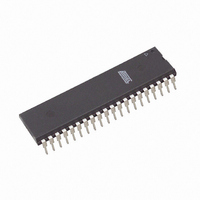ATMEGA32A-PU Atmel, ATMEGA32A-PU Datasheet - Page 161

ATMEGA32A-PU
Manufacturer Part Number
ATMEGA32A-PU
Description
MCU AVR 32K FLASH 16MHZ 40-PDIP
Manufacturer
Atmel
Series
AVR® ATmegar
Specifications of ATMEGA32A-PU
Core Processor
AVR
Core Size
8-Bit
Speed
16MHz
Connectivity
I²C, SPI, UART/USART
Peripherals
Brown-out Detect/Reset, POR, PWM, WDT
Number Of I /o
32
Program Memory Size
32KB (16K x 16)
Program Memory Type
FLASH
Eeprom Size
1K x 8
Ram Size
2K x 8
Voltage - Supply (vcc/vdd)
2.7 V ~ 5.5 V
Data Converters
A/D 8x10b
Oscillator Type
Internal
Operating Temperature
-40°C ~ 85°C
Package / Case
40-DIP (0.600", 15.24mm)
Processor Series
ATMEGA32x
Core
AVR8
Data Bus Width
8 bit
Data Ram Size
2 KB
Interface Type
2-Wire, SPI, USART
Maximum Clock Frequency
16 MHz
Number Of Programmable I/os
32
Number Of Timers
3
Maximum Operating Temperature
+ 85 C
Mounting Style
Through Hole
3rd Party Development Tools
EWAVR, EWAVR-BL
Development Tools By Supplier
ATAVRDRAGON, ATSTK500, ATSTK600, ATAVRISP2, ATAVRONEKIT
Minimum Operating Temperature
- 40 C
On-chip Adc
10 bit, 8 Channel
Package
40PDIP
Device Core
AVR
Family Name
ATmega
Maximum Speed
16 MHz
Operating Supply Voltage
3.3|5 V
Data Rom Size
1024 B
Height
4.83 mm
Length
52.58 mm
Supply Voltage (max)
5.5 V
Supply Voltage (min)
2.7 V
Width
13.97 mm
Controller Family/series
AVR MEGA
No. Of I/o's
32
Eeprom Memory Size
1KB
Ram Memory Size
2KB
Cpu Speed
16MHz
Rohs Compliant
Yes
For Use With
ATSTK524 - KIT STARTER ATMEGA32M1/MEGA32C1ATSTK600 - DEV KIT FOR AVR/AVR32ATAVRDRAGON - KIT DRAGON 32KB FLASH MEM AVRATSTK500 - PROGRAMMER AVR STARTER KIT
Lead Free Status / RoHS Status
Lead free / RoHS Compliant
Available stocks
Company
Part Number
Manufacturer
Quantity
Price
Company:
Part Number:
ATMEGA32A-PU
Manufacturer:
ATMEL
Quantity:
3 000
Company:
Part Number:
ATMEGA32A-PU
Manufacturer:
Atmel
Quantity:
26 792
- Current page: 161 of 353
- Download datasheet (6Mb)
19.7.6
19.7.7
19.8
19.8.1
8155C–AVR–02/11
Asynchronous Data Reception
Disabling the Receiver
Flushing the Receive Buffer
Asynchronous Clock Recovery
The PE bit is set if the next character that can be read from the receive buffer had a parity error
when received and the parity checking was enabled at that point (UPM1 = 1). This bit is valid
until the receive buffer (UDR) is read.
In contrast to the Transmitter, disabling of the Receiver will be immediate. Data from ongoing
receptions will therefore be lost. When disabled (that is, the RXEN is set to zero) the Receiver
will no longer override the normal function of the RxD port pin. The receiver buffer FIFO will be
flushed when the receiver is disabled. Remaining data in the buffer will be lost.
The receiver buffer FIFO will be flushed when the Receiver is disabled, that is, the buffer will be
emptied of its contents. Unread data will be lost. If the buffer has to be flushed during normal
operation, due to for instance an error condition, read the UDR I/O location until the RXC Flag is
cleared. The following code example shows how to flush the receive buffer.
Note:
The USART includes a clock recovery and a data recovery unit for handling asynchronous data
reception. The clock recovery logic is used for synchronizing the internally generated baud rate
clock to the incoming asynchronous serial frames at the RxD pin. The data recovery logic sam-
ples and low pass filters each incoming bit, thereby improving the noise immunity of the receiver.
The asynchronous reception operational range depends on the accuracy of the internal baud
rate clock, the rate of the incoming frames, and the frame size in number of bits.
The clock recovery logic synchronizes internal clock to the incoming serial frames.
illustrates the sampling process of the start bit of an incoming frame. The sample rate is 16 times
the baud rate for Normal mode, and 8 times the baud rate for Double Speed mode. The horizon-
tal arrows illustrate the synchronization variation due to the sampling process. Note the larger
time variation when using the double speed mode (U2X = 1) of operation. Samples denoted zero
are samples done when the RxD line is idle (that is, no communication activity).
Assembly Code Example
C Code Example
USART_Flush:
void USART_Flush( void )
{
}
sbis UCSRA, RXC
ret
in
rjmp USART_Flush
unsigned char dummy;
while ( UCSRA & (1<<RXC) ) dummy = UDR;
1. See
r16, UDR
“About Code Examples” on page
(1)
(1)
6.
ATmega32A
Figure 19-5
161
Related parts for ATMEGA32A-PU
Image
Part Number
Description
Manufacturer
Datasheet
Request
R

Part Number:
Description:
Manufacturer:
Atmel Corporation
Datasheet:

Part Number:
Description:
Manufacturer:
ATMEL Corporation
Datasheet:

Part Number:
Description:
IC AVR MCU 32K 16MHZ 5V 44-QFN
Manufacturer:
Atmel
Datasheet:

Part Number:
Description:
IC AVR MCU 32K 16MHZ 5V 40DIP
Manufacturer:
Atmel
Datasheet:

Part Number:
Description:
IC AVR MCU 32K 16MHZ 5V 44TQFP
Manufacturer:
Atmel
Datasheet:

Part Number:
Description:
IC AVR MCU 32K 16MHZ IND 40-DIP
Manufacturer:
Atmel
Datasheet:

Part Number:
Description:
IC AVR MCU 32K 16MHZ IND 44-TQFP
Manufacturer:
Atmel
Datasheet:

Part Number:
Description:
MCU AVR 32KB FLASH 16MHZ 44TQFP
Manufacturer:
Atmel
Datasheet:

Part Number:
Description:
MCU AVR 32KB FLASH 16MHZ 44QFN
Manufacturer:
Atmel
Datasheet:

Part Number:
Description:
MCU AVR 32K FLASH 16MHZ 44-TQFP
Manufacturer:
Atmel
Datasheet:

Part Number:
Description:
IC AVR MCU 32K 16MHZ COM 40-DIP
Manufacturer:
Atmel
Datasheet:

Part Number:
Description:
IC AVR MCU 32K 16MHZ COM 44-QFN
Manufacturer:
Atmel
Datasheet:

Part Number:
Description:
IC AVR MCU 32K 16MHZ COM 44-TQFP
Manufacturer:
Atmel
Datasheet:











